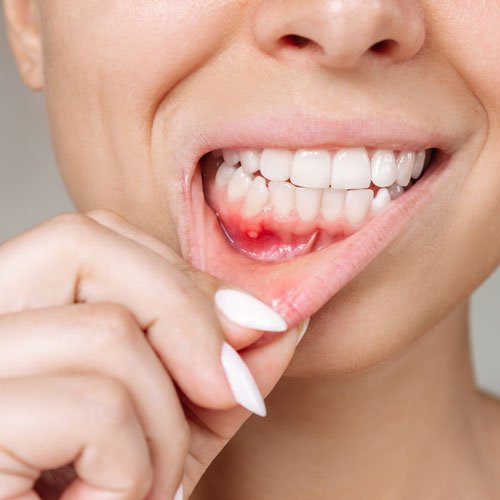Mouth ulcers: Causes, treatment and prevention
Mouth ulcers can be painful and irritating, but the most common ones aren’t too serious. In fact, they’ll usually heal by themselves within one to two weeks.
Of course, there are a few things you can do to reduce their likelihood, and it’s also important to know when a mouth ulcer is a symptom of something more serious.
Read on to learn all you need to know about mouth ulcers, their causes, treatments and when to go and see someone about them.
In this guide:
What are mouth ulcers?
Ulcers are sores caused by a break or tear in the skin, often looking like craters with raised bumps around their edge. Mouth ulcers are exactly the same, but in the mouth.
They might occur only once, or come back every so often. Sometimes they’ll be alone, sometimes there will be more than one. It really does vary depending on your mouth!
You may also see common mouth ulcers referred to as canker sores, which are the most common type of mouth ulcer.
What do mouth ulcers look like?
Mouth ulcers usually look like craters or breaks in the soft inside lining of your mouth (called the mucosal membrane, if you’re interested), often with a raised and inflamed edge. They can also form on the base of your gums.
Typically, mouth ulcers will be either white-ish or yellowish in colour. They’re usually very small, a few millimetres across, but they can grow a lot larger in some cases – up to a couple of centimetres. Ouch!
Mouth ulcers versus cold sores
Mouth ulcers and cold sores are not the same thing.
Whereas mouth ulcers are more or less just breaks in the skin which form inside the mouth, cold sores are contagious, fluid-filled lumps which generally appear on the outside of the mouth, around the lips.
Cold sores are caused by the herpes simplex virus (HSV) type 1, which is present in about 67% of the world’s population under the age of 50 (source).
What causes mouth ulcers?
The most common causes of mouth ulcers are:
Injury, including biting your tongue or cheeks, or burning your mouth.
Food intolerances or allergies.
A rough edge on a tooth, or a tooth which has come in at the wrong angle (and is rubbing against your cheek).
Ill-fitting dentures.
Harsh mouthwashes causing irritation.
Certain life factors may contribute to the likelihood you will form mouth ulcers, including:
Stress and lack of sleep.
Certain medications.
Abrasive toothpastes.
Certain nutrient deficiencies (like vitamin B12, folate or iron).
Some underlying gastrointestinal conditions like Crohn’s or coeliac disease.
Mouth cancer.
Why are mouth ulcers so painful?
Mouth ulcers can be very painful, especially large ones, because there are a lot of nerves very close to the surface of the skin in your mouth. Damage to that skin can impact the nerves quite strongly.
Are mouth ulcers a sign of mouth cancer?
They can be, but usually aren’t.
The sign that you should go and see your dentist about a mouth ulcer is generally when it doesn’t heal within about two weeks. This is especially true if you are someone already at a higher risk of mouth cancer, for example:
You regularly use tobacco products, such as smoking.
You consume a lot of alcohol.
You have the HPV virus.
You receive excessive sun exposure to your lips.
You have a weakened immune system.
In these cases, or if you’re worried in general, a trip to the dentist may be in order to get it looked at more closely. Your dentist will also be able to offer you more personalised advice about your situation and symptoms.
Learn more: Oral cancer
Mouth ulcers treatment
Treating mouth ulcers at home
Generally speaking, a common mouth ulcer will heal itself within about one to two weeks. In most cases you won’t need to buy any products to help it heal, although there are a few temporary changes you can make to your lifestyle to help it along. Those include:
Taking care while brushing that area to avoid damaging the ulcer further.
Rinsing regularly with a warm, salt-water rinse.
Avoiding very spicy or very acidic foods until you’re in the clear.
Drinking plenty of fluids.
If your ulcer is particularly large and/or painful, you may also wish to consider switching to softer foods for a few days to avoid irritating the site with anything crunchy or spiky.
Pharmacy products for mouth ulcers
There are some pharmacy products available for treating mouth ulcers, which your local pharmacist can advise you on. For example:
Antiseptic mouthwash.
Protective gels or pastes (which can help seal and protect the wound).
Steroid ointments, which can offer pain relief and anti inflammation (you’ll need a prescription for some of these).
Other pain-relievers, like sprays, gels, ointments and tablets.
If your mouth ulcer is caused by a viral infection, you may need to talk to your doctor about antiviral treatment.
When to see a doctor or dentist about mouth ulcers
For most common ulcers, you do not need to see a dentist or doctor. You would generally only need to go and seek specific treatment if your ulcer is particularly large and painful, recurs often, or doesn’t heal within that two-week period.
If similar sores start to appear on other parts of your body, this is also a sign to go and see a doctor as it may be a symptom of a wider problem (such as hand, foot and mouth disease).
How to prevent mouth ulcers
Mouth ulcers are not always entirely preventable, as accidents do happen. That said, improved oral hygiene and a trip to the dentist, plus some lifestyle changes, can reduce your chances of forming mouth ulcers which aren’t related to injury.
Some factors to consider are:
Get on top of your oral hygiene – brushing twice a day. If your mouth is prone to irritation, consider switching to a soft-bristled brush.
Talk to your dentist about fixing damaged teeth, rough surfaces, teeth rubbing against your gums, or ill-fitting dentures.
Eat a balanced, healthy diet.
Quit smoking, and limit alcohol consumption.
Try to reduce your stress and anxiety, and improve sleep habits.
Need to speak to a dentist? Come and see us
Our professionally trained dentists and dental hygienists are ready to help. We’ll take the time to understand your mouth, and recommend the best course of action for your needs.
To book an appointment, pop in to see us on Maunu Road, give us a call at 09 430 0707, or book online.


